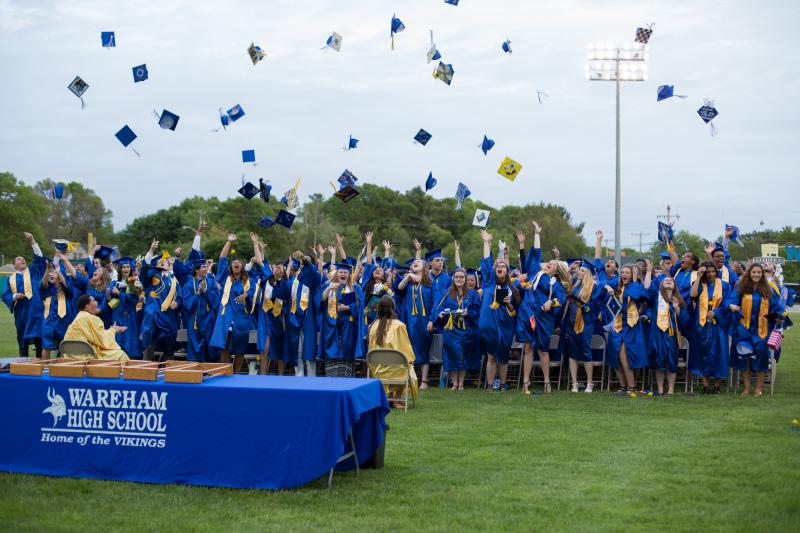Wareham High School to become an International Baccalaureate candidate school
Starting next fall, Wareham High School students will have the chance to go right into their sophomore year of college.
Superintendent Kimberly Shaver-Hood said the district, in an effort to give students more options, as well as make Wareham more attractive and competitive with other school districts, will be implementing the International Baccalaureate Diploma program at the high school. It will be fully grant-funded and will be part of the new Academy for Innovators and Entrepreneurs at the school, headed by Coordinator Mark Blake. The district currently has a grant from International Baccalaureate for $75,000, and is applying to get between $325,000 to $425,000 in grants and foundation money to start up the program.
The International Baccalaureate organization was founded in 1968, and offers an advanced academic track for students at 3,500 different IB-certified schools in 145 countries. The organization offers the primary years program for students ages 3 - 12; the middle years program for students ages 11 - 16; and the diploma program for students ages 16 - 19.
The high school-specific diploma program puts students on a four-year-long academic track that begins when students are in their freshman year of high school. It runs parallel to a standard high school diploma program, but the classes offered are much more rigorous, in order to mimic college-level classes. Students who pass the courses will be able to go straight into their sophomore year of college, if their chosen college recognizes IB certification.
“This has been going on since January … and we are pretty excited,” Shaver-Hood said. “Earlier in the year, we applied, and got IB candidate status, so we are now a candidate school.”
Shaver-Hood said the district has sent High School Principal Scott Palladino to IB training and will soon be sending High School staff to training as well. It will take the High School another two and a half years to become a full IB school, but the program will still be fully operational come next fall.
Shaver-Hood also said the school will not be doing this alone. It has partnered with UMass-Boston, and will be bringing in professors from different fields to teach the IB classes, in order to up the academic rigor.
Blake said the district is also looking at other classes on the more technical side of things, such as graphic design, 3D printing, and video editing classes, in order to keep students as up-to-date as possible with the modern job market.
“We are looking at all the emerging industries, and seeing how that parallels with curriculum, as well as parallels with what the IB offers,” Blake said.
The program, however, will not focus solely on academics. Instead of assessing students through only the traditional avenues of mathematics, English, and science, Director of Curriculum and Instruction Andrea Schwamb said the school will also be looking at students’ emotional side.
“We are looking to help the students find who they are in it, and be active participants in the process,” Schwamb said. “We are looking at some social-emotional intelligence work, maybe some mindfulness inventory work … and a good career inventory … to make sure we are addressing where they are coming from, in various areas of their world.”
Schwamb said the school will also allow students who do not want to be in the four-year IB program, but still explore the program curriculum, to take individual classes from the program. Like advanced placement courses, the baccalaureate classes will allow the students to skip those classes in their freshman year of college. Wareham Cooperative School students are also allowed to take program classes.
There will also be a career program path students may follow, which focuses more on the hands-on side of learning. In addition to approaching other area universities, Shaver-Hood said the district is interested in partnering with “institutions on career and technical opportunities.”
“One of the pieces we are actively pursuing is aquaculture,” Shaver-Hood said. “We have looked at oyster reclamation and are excited about the direction we appear to be heading.”
Students won’t be barred from taking classes from both programs, as the school has specifically chosen classes for both tracks that can dovetail with one another.
“What we don’t want to do is stop opportunity,” Schwamb said. “If you have a student who is really hands-on, they are still really smart. They still should have access to really rigorous material. … They may be career-minded, but they need to have the option, at some point in their life, if they choose, to be ready to go to college.”
Aside from bringing in college professors, Shaver-Hood said there are currently no plans to hire new staff for the program, which will take between 30 and 40 students in its first year.
“We are looking for this program to be self-sustaining, and be a viable option for our students,” Shaver-Hood said. “What we want to provide for our students is a high-quality education.”
Shaver-Hood also said the Middle School is set to receive a similar track under the IB middle years program. As in the High School, middle school students outside the program will be welcome to take classes from the program, too.













